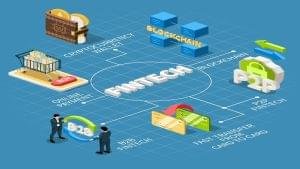Fintech, an abbreviation for financial technology, is rapidly transforming the way businesses and individuals get financial services. The global fintech market was worth roughly $127.66 billion in 2018 and is expected to expand at a 24.8% annual rate to $309.98 billion by 2022. So, what exactly is fintech? Financial technology refers to companies, mainly start-ups, that are disrupting the financial services market and encompasses a wide spectrum of financial services. According to KPMG’s Fintech 100, the most prevalent industries for fintech companies are payments and transactions, lending and credit, and wealth and brokerage.
However, fintech is expanding into other financial sectors, such as blockchain, mortgages, and neo-banks. Digital natives such as Pockit and Stash, either without or with a recently given banking license, challenge established banks’ and financial service organizations’ goods, services, and user experiences.
From payment apps like PayPal (PYPL)
Get Report or Venmo to even cryptocurrency, fintech has been used for many of the most recent technological developments,” writes Anne Sraders for financial news website TheStreet. “By combining the most recent technological advances with financial services or applications, fintech has enabled businesses – primarily start-ups – to disrupt the industry and provide better financial services to businesses and individuals alike.”
The rise of financial technology has a dual impact on the banking sector. On the one hand, it is providing ways for banks to improve the services they provide to their customers, with banks using tools such as chatbots to improve customer experience, mobile apps to provide customers with a real-time view of their bank accounts, and machine learning to protect against fraud. On the other hand, fintech is putting traditional banking and financial services under pressure from all sides, endangering the future of some of our most well-known organizations.
For the past three years, Starling, a 100% digital bank, has been crowned ‘Best British Bank’ at the British Bank Awards, surpassing traditional competitors such as Barclays, First Direct, Halifax, and Nationwide.
Fintech also enables non-financial enterprises to provide financial services. Gusto, an online HR and benefits platform, recently launched a wallet service that allows employees to save with an interest-bearing cash account and spend with a Gusto-branded debit card, and Element, an online insurance company, has partnered with Vodafone to develop a new cyber-security insurance for private Vodafone mobile network users.
What is the appeal of fintech?
Banking and financial services are becoming more simplified and accessible as a result of fintech. Users can use technology to profit from automation to speed up previously manual tasks. While some financial services continue to rely on a combination of advisors and algorithms, other transactions, such as applying for a mortgage or loan, can now be conducted quickly and efficiently online, without the need for human intervention. While this is fantastic news for end users, it is producing major disruption for the market’s more established competitors.
So, how is big business dealing with fintech?
According to the most recent PwC Global Fintech Report, the question is no more whether fintech will alter financial services, but which companies will use technology most effectively and emerge as leaders:
“Previously, financial services (FS) firms and technology, media, and telecommunications (TMT) firms traveled side by side, sometimes on the same roads but not usually in each other’s lanes.” However, the distinctions between FS and TMT enterprises have become so blurred that the roadways are now a free for all, and previously different sectors are colliding. Many TMT firms are asking for FS licenses, and FS firms have begun to refer to themselves as technology firms. The financial technology industry is at the epicenter of this shift.”
It appears that adopting technology is the best way to ensure the survival of traditional banking. According to PwC, 48% of financial services organizations have fully integrated fintech into their strategic operating model as of 2019, and 37% have integrated new technology into the products and services they sell. Businesses will also need to employ fintech to improve the simplicity and speed of their services, as well as to enable the mass customisation and personalisation that consumers have come to expect.
Not every fintech, however, competes with traditional banking. Traditional banks are broadening their product portfolios and offering technology-based services, while large banks are also using fintech through investments. In 2019, JP Morgan spent $25 million in fintech start-ups, Capital One established technology-focused ‘banking cafes,’ and Citi opened the Citi Developer Hub to encourage third-party programmers to test and provide feedback on their APIs.
Nydoz Fintech
At NYDOZ, we are committed to staying at the forefront of the fintech sector and employing cutting-edge technologies to produce new solutions that alter the financial world. We cover the latest trends, developments, and insights in fintech on our blog, providing expert analysis and comments on topics ranging from AI and machine learning to blockchain and digital currencies. You can profit from competitive fixed-interest-rate returns on your NYDOZ investment while also supporting the development and expansion of next-generation financial products. It aids personal financial management by generating passive revenue. So, give it a shot.
What does this portend for the banking industry’s future?
According to a Bank for International Settlements assessment, fintech developments have the potential to benefit all users of financial services:
“These include increasing access to financial services (financial inclusion), reaching out to underserved consumers, lowering transaction costs, increasing transparency with simpler products and clear cost disclosures, increasing convenience and efficiency, and enabling tighter controls over spending and budgeting.” Together, these can improve the consumer experience by offering a better grasp of items and concepts.”
However, the rise of financial technology is causing a skills shortage. According to Autonomous Research, machine learning and AI might replace over $1 trillion of the present financial services cost structure by 2030. Despite the fact that there is still a lot of opportunity for a successful career in banking and finance – 75% of financial services organizations are developing jobs related to new technology – 42% are having difficulty filling these positions.
Studying for an online MSc in Applied Economics (Banking and Finance) will provide you with the knowledge, insight, and practical experience you need to face the difficulties that the finance industry faces today and in the future. The skills taught on the practical Economics MSc online pave the way for a variety of occupations in economics, banking, and finance, with a focus on practical practices and employability. Please fill out the form below for additional information, and a member of our staff will contact you.




